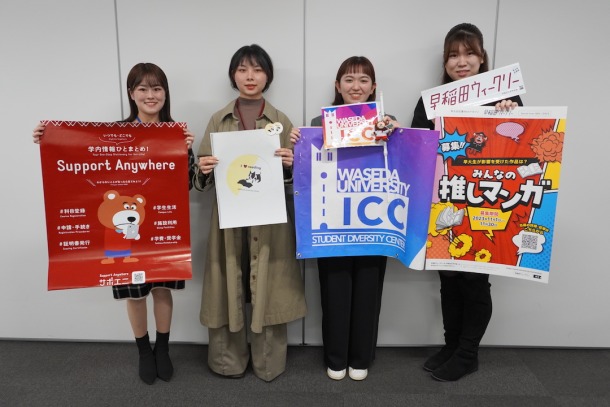
(From left) Shiga, Liu, Okuhara, and Sato
Waseda University promotes "Student Participation/Student Jobs" (hereinafter referred to as "Student Jobs"), which utilizes students' expertise and creativity in university management. As part of this, student staff work on-campus and are involved in a variety of tasks that help improve the university's profits and value. Student staff are expected to continue to play important roles within the university. Where and how do they actually work? Therefore, this time we held a roundtable discussion with four student staff members who actually work in each department. We asked them about their specific activities, what they can gain from working at a university, and their message to students who are interested in student jobs.
Miyabi Shiga, 4th year School of Culture, Media and Society Academic Advising Office
Risaki Sato 4th year student School of Human Sciences Student Affairs Section Weekly Editorial Office
Iroha Okuhara, 4th year School of Culture, Media and Society ICC (Intercultural Communication Center)
Dept. of Users Support Graduate Graduate School of Education Master's Course, 2nd year student, Giman Liu
General information counter, public relations activities, event planning, support for library users... There are various ways of working in each part of the university.
--First of all, please tell us about your business.
Shiga: Academic Advising Office (hereinafter referred to as WPO) serves as the university's general information desk and handles many application procedures and consultations. The student staff's job is to solve various problems for users and manage found items on campus. We also carry out ``Student Projects,'' which utilize ideas and suggestions from a student's perspective to improve business operations.
Sato: "Waseda Weekly" (hereinafter referred to as "Weekly") is the university's official web magazine run by Student Affairs Division. My job mainly consists of two parts: producing articles and managing the official SNS. It depends on the article being produced, but I am involved in everything from making appointments to interview candidates to creating article pages, and I have produced many articles so far. We also promote published articles and introduce on-campus events through SNS.
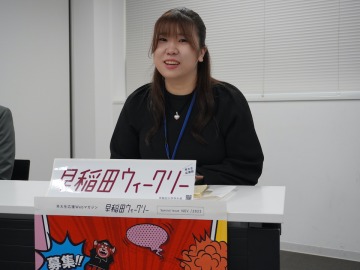
Sato produces many articles as a student staff member. In high school, he belonged to the broadcasting club and read various manuscripts, but he thought, ``I want to write articles myself!'' and applied to be a student staff member at Weekly.
Okuhara: At ICC, students take the lead in planning and managing various events in order to promote cross-cultural exchange between students. We hold about 200 events a year, and so far I have been in charge of talk session events and the establishment of a podcast channel called ICC Radio.
Liu: I work as a learning assistant (LA) at Central Library. The LA's job is to provide a wide range of support for students' use of the library, including providing information about the library, how to search for library materials, and providing consultation regarding reports and papers. We also propose improvements to library facilities from a student perspective and plan events within the library.
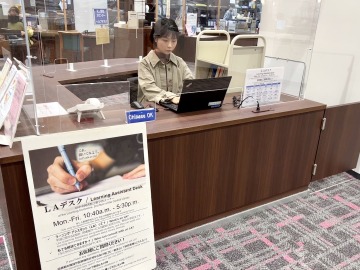
A view of the LA desk on the second floor Central Library. Liu, who researches modern Japanese literature, decided to apply to Waseda University when he entered graduate school because he was attracted to the fact that it had the largest library collection among private universities.
--What do you think are the characteristics of student jobs?
Sato: I think being able to work together with staff is unique to student jobs. I was able to learn how to respond to calls and emails, and I was able to develop a sense of responsibility towards my work. For a short period of time, there are options such as internships, but I think it is the privilege of student staff working at a university to be able to experience a variety of things on an ongoing basis.
Okuhara: That's a big point. While planning ICC events, I had many opportunities to work with people outside the university, and before I knew it, I had acquired business-style honorific language.
Liu: When I'm at the library, I often receive consultations in English or Chinese. Waseda University has always had a large number of international students, but it seems like the number has increased even more since the pandemic subsided. I think it is because I do this job that I am able to have contact with such a diverse range of students.
Shiga: There are many international students at WPO as well. It is not uncommon for me to provide consultation services in English. Actually, I previously conducted a student-led project with the objective of ``training your English skills.'' After discussions among the staff and with their help, we came up with a concrete plan for improving English training and creating a manual. I feel that having an environment that respects and supports students' ideas and independence is a symbol of the Student Job.
Photo left: Okuhara (left on stage), who is in charge of event planning and management. She said she applied to be a student staff member at ICC during the spring semester of her second year because she had studied abroad in high school and wanted to do a job where she could make use of her English skills.
Photo on the right: Shiga works at WPO, where he has many opportunities to interact with people, because he wants to acquire basic skills as a member of society. In addition to day-to-day customer service, she also handles online student counseling and other duties.
The hardships of working in a university organization, the activities that only Waseda can do, and the sense of accomplishment you get
――Are there any activities or events that left a lasting impression on you through your work so far?

“Voices of Waseda” is operated by ICC. The program interviews various people at Waseda University and digs deeper into their activities and values.
Okuhara: ICC Radio, which I mentioned earlier, was the first project I worked on, and the road to its establishment was really difficult. In the past, when I was running a personal podcast with a friend, I could easily post a number of posts, but that doesn't happen with ICC. It takes many months for each episode to be released, as many people carefully check the content to make sure it's not biased or hurtful. By distributing it as an official university program, many people heard about it, but on the other hand, it really taught me the importance and difficulty of such compliance.
Sato: I've always felt that way. Even for the weekly magazine, article manuscripts are proofread multiple times by sources and staff. After all, we are disseminating information as an official university publication, so we feel a sense of responsibility every time a manuscript is revised. On the other hand, it is precisely because we are run by Waseda University that we are able to introduce a diverse range of students and interview well-known alumni. And when we receive a lot of feedback on an article we publish, it feels like all our hard work has been worth it.
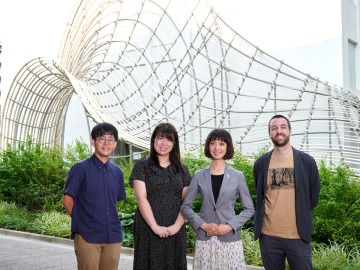
In an article introducing The Waseda International House of Literature (Murakami Haruki Library), I visited the facility as a reporter and introduced the attractions inside the facility from a student's perspective (Sato is second from the left. Photo: Sakae Takahashi)
--When do you feel the student job is rewarding?
Shiga: I am very happy when someone is satisfied with my response. We receive a variety of inquiries on a regular basis, and some of them are faced with complex matters where it is not clear which contact point within the university they should contact. In order to avoid such people being passed around, I try to use the information I know and the materials I have in the office, and work with other staff members to guide them appropriately. It is very rewarding when I am able to make a proposal that is tailored to the person's situation, and when they express their gratitude.
Liu: I understand! I think there are many cases where the person seeking advice doesn't realize that the person is a student. That is why, as the face of Waseda, I want to respond in a way that is not embarrassing. When I first started working at Student Job, I read and re-read the training materials over and over again, trying to be able to work as a staff member as soon as possible. Thanks to the support of my staff and senior colleagues, I am proud that I am now able to properly respond to questions about the library and consultations about papers and reports.
Okuhara: I feel fulfilled when the event is a success. I'm happy when I successfully design a poster for a project I'm in charge of, and I feel a sense of accomplishment when the number of applications for an event increases or the results of a post-event survey are positive.
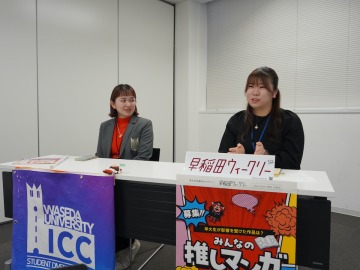
After listening to Okuhara's story, Sato agreed, saying, ``I am always concerned about the reactions to the articles I write.''
Sato: In the case of Weekly, my work remains in the form of articles, so when I reread what I've written so far, I feel like ``I'm doing my best!'' (laughs) Once, someone told me that they read an article I wrote at my off-campus part-time job. At that time, I felt proud that I was playing a part in promoting the university. I really enjoy getting to know Waseda's diverse students and cultures through my weekly work.
Okuhara: I also get information from Weekly when looking for guests for events!
Shiga: Actually, in addition to the portal office, I also work at Accessibility Resource Center (ARC), and I was previously interviewed for an article about student jobs.
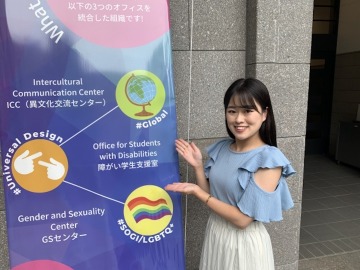
Shiga's activities at Accessibility Resource Center are introduced in the article "Student Paricipation and Job" published in October 2022. He talks about his work as a student staff member and his future goals.
Liu: Is that so!? It seems like having a side job as a student job is difficult, but it also seems like there's a lot to be gained from it.
Shiga: Both WPO and ARC involve a lot of work that involves working with people, and I had the opportunity to interact with a really wide variety of people. I started working as a student staff member at ARC in the spring semester of my second year, and at WPO in the fall semester, and I feel that by working at both locations, I have expanded my connections with people and my perspective on work.
--Please give a message to students who are interested in student jobs.
Sato: I would encourage people who want to find something they want to do at university to give it a try. You can really experience a lot of things, so it's definitely not a loss. I usually go to Tokorozawa Campus, but I would like to recommend it to students who don't often come to Waseda or Toyama Campus, as they pay for my transportation to Toyama Campus campus, where the weekly editorial office is located.
Liu: I think working within the university is a good experience in terms of learning more about the university. Waseda University offers a variety of opportunities for student participation, so if you have any interest in the job, please apply!
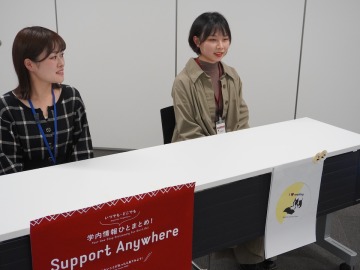
Although they share the same job of working at the counter, they have different roles within the university. We listened to each other's stories with great interest.
Okuhara: I was able to find a place at ICC and have a fulfilling university life. It is good to have a desire to improve your experience and skills, but I also hope that you will take on the challenge without hesitation, such as ``I want to make friends'' or ``I want to meet as many students as possible.''
Shiga: I think it's a really fun workplace because I get to interact with all kinds of people, both inside and outside the university. You will meet and learn many things through these activities, so I hope that you will have a unique Waseda experience through the student job.
--Finally, please give us a few words as you look back on Student Job.
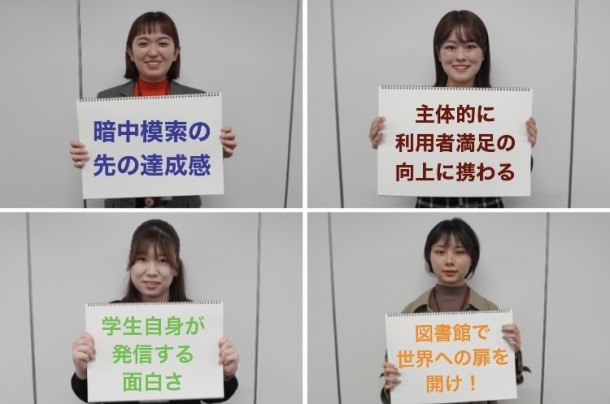
Okuhara (top left): Some ICC events take more than half a year to create. When you go through a lot of hard work and successfully complete an event, you feel a sense of accomplishment, which boosts your self-confidence.
Shiga (top right): I am now able to think about how to respond to university visitors in a way that will satisfy them, and I am now able to act independently.
Sato (lower left): It's really fun to be able to share information about the university from the student's own perspective. I was also able to experience the fun of work such as reporting and editing.
Liu (bottom right): I want more people to use LA's services and utilize the library!
After finishing the interview
Waseda Weekly Reporter Sakuma
Up until now, I have not had many opportunities to interact with student staff from other departments, and I myself received a lot of inspiration from the roundtable discussions. As the roundtable participants said, one of the characteristics of student jobs is that you can gain basic skills as a member of society and experience in promoting projects with multiple people. However, more than that, I believe that the experience of working with staff to support the university's operations and transform it into a rich environment is possible only through student jobs, and this is also the role that Waseda University expects of us. It would be a waste to make universities just a place to take classes! Why not make use of the knowledge and experience you have acquired during your university life and work with us to create a better Waseda as a student staff member?
*The recruitment period for student jobs varies depending on the department, and will be notified through MyWaseda notifications.
Planning/coverage/text: Waseda Weekly Reporter (SJC student staff)
Ryusei Sakuma, 4th year School of Law
Planning and cooperation: Waseda Weekly Reporter
Risaki Sato, 4th year School of Human Sciences
▼Currently recruiting student staff and monitors for the 2024 spring semester for “Waseda Weekly”! Click here for details

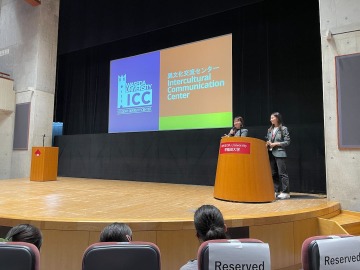
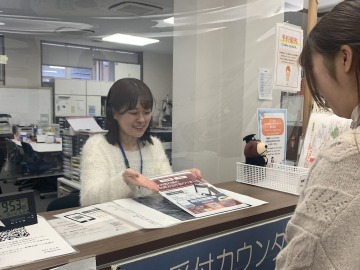
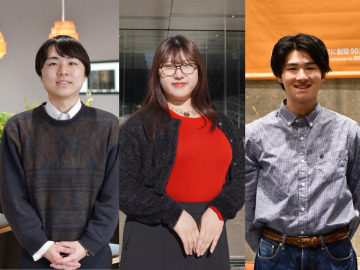
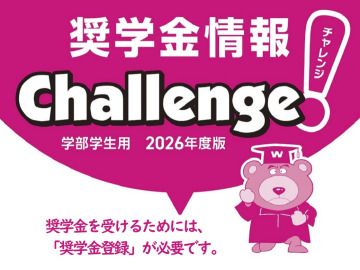
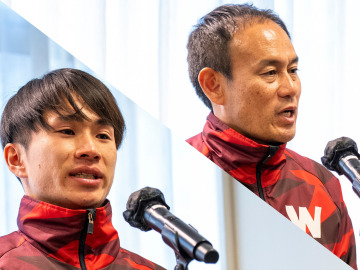
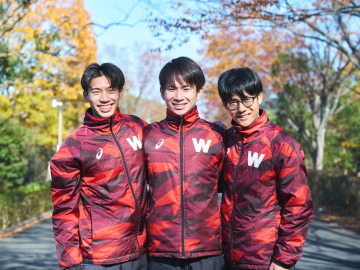

![[Save version] Map of the four main campuses](https://www.waseda.jp/inst/weekly/assets/uploads/2025/09/17cb2975123fc5103172ef60bd98608d-610x458.jpg)

